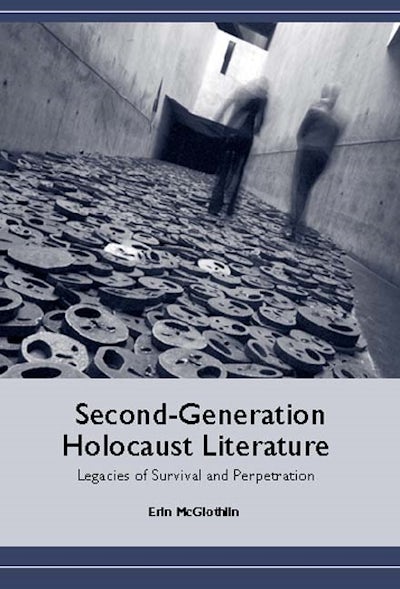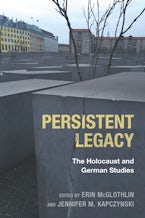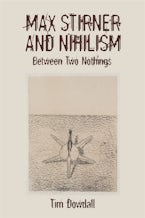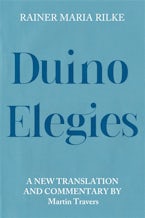
Title Details
264 Pages
22.8 x 15.2 cm
3 b/w illus.
Series: Studies in German Literature Linguistics and Culture
Series Vol. Number:
94
Imprint: Camden House
Second-Generation Holocaust Literature
Legacies of Survival and Perpetration
- Description
- Contents
- Author
- Reviews
Expands the definition of second-generation literature to include texts written from the point of view of the children of Nazi perpetrators.
Among historical events of the 20th century, the Holocaust is unrivaled as the subject of both scholarly and literary writing. Literary responses include not only thousands of autobiographical and fictional texts written by survivors, but also, more recently, works by writers who are not survivors but nevertheless feel compelled to write about the Holocaust. Writers from what is known as the second generation have produced texts that express their feeling of being powerfully marked by events of which they have had no direct experience. This book expands the commonly-used definition of second-generation literature, which refers to texts written from the perspective ofthe children of survivors, to include texts written from the point of view of the children of Nazi perpetrators. With its innovative focus on the literary legacy of both groups, it investigates how second-generation writers employsimilar tropes of stigmatization to express their troubled relationships to their parents' histories. Through readings of nine American, German, and French literary texts, Erin McGlothlin demonstrates how an anxiety with signification is manifested in the very structure of second-generation literature, revealing the extent to which the literary texts themselves are marked by the continuing aftershocks of the Holocaust.
Erin McGlothlin is Assistant Professor of German at Washington University in St. Louis.
Among historical events of the 20th century, the Holocaust is unrivaled as the subject of both scholarly and literary writing. Literary responses include not only thousands of autobiographical and fictional texts written by survivors, but also, more recently, works by writers who are not survivors but nevertheless feel compelled to write about the Holocaust. Writers from what is known as the second generation have produced texts that express their feeling of being powerfully marked by events of which they have had no direct experience. This book expands the commonly-used definition of second-generation literature, which refers to texts written from the perspective ofthe children of survivors, to include texts written from the point of view of the children of Nazi perpetrators. With its innovative focus on the literary legacy of both groups, it investigates how second-generation writers employsimilar tropes of stigmatization to express their troubled relationships to their parents' histories. Through readings of nine American, German, and French literary texts, Erin McGlothlin demonstrates how an anxiety with signification is manifested in the very structure of second-generation literature, revealing the extent to which the literary texts themselves are marked by the continuing aftershocks of the Holocaust.
Erin McGlothlin is Assistant Professor of German at Washington University in St. Louis.
Introduction: Rupture and Repair: Marking the Legacy of the Second Generation
"A Tale Repeated Over and Over Again": Polyidentity and Narrative Paralysis in Thane Rosenbaum's Elijah Visible
"In Auschwitz We Didn't Wear Watches": Marking Time in Art Spiegelman's Maus
"Because We Need Traces": Robert Schindel's Gebürtig and the Crisis of the Second-Generation Witness
Documenting Absence in Patrick Modiano's Dora Bruder and Katja Behrens's "Arthur Mayer, or The Silence"
"Under a False Name": Peter Schneider's Vati and the Misnomer of Genre
My Mother Wears a Hitler Mustache: Marking the Mother in Niklas Frank and Joshua Sobol's Der Vater
The Future of Väterliteratur: Bernhard Schlink's Der Vorleser and Uwe Timm's Am Beispiel meines BrudersAm Beispiel meines Bruders
Conclusion: The "Glass Wall": Marked by an Invisible Divide
Works Cited
Index
"A Tale Repeated Over and Over Again": Polyidentity and Narrative Paralysis in Thane Rosenbaum's Elijah Visible
"In Auschwitz We Didn't Wear Watches": Marking Time in Art Spiegelman's Maus
"Because We Need Traces": Robert Schindel's Gebürtig and the Crisis of the Second-Generation Witness
Documenting Absence in Patrick Modiano's Dora Bruder and Katja Behrens's "Arthur Mayer, or The Silence"
"Under a False Name": Peter Schneider's Vati and the Misnomer of Genre
My Mother Wears a Hitler Mustache: Marking the Mother in Niklas Frank and Joshua Sobol's Der Vater
The Future of Väterliteratur: Bernhard Schlink's Der Vorleser and Uwe Timm's Am Beispiel meines BrudersAm Beispiel meines Bruders
Conclusion: The "Glass Wall": Marked by an Invisible Divide
Works Cited
Index
"McGlothlin effectively borrows from psychology in her discussion of trauma ... using the concept of dissociation to examine both character and narrative structure. ... In addition to a sound overall analysis, the author also exhibits a true gift for rhetoric. For example, in the introduction, McGlothlin examines the etymology of the word stigmata and those historically branded with marks, a fate for both the innocent (slaves) and the guilty (criminals)...." GERMAN STUDIES REVIEW
"This book is a gem. International and interdisciplinary in content, it sheds new and important light on the continuing legacy of the Holocaust for those who come after the event but continue to live in its unending shadow." Alan L. Berger, Florida Atlantic University
"Erin McGlothlin's book ... makes an important contribution to the relatively new sub-field of second-generation literature within Holocaust Studies.... McGlothlin is a careful and responsible researcher, and an equally careful reader of texts.... Her project is not to theorize the vicissitudes of text and the belatedness of trauma as it surfaces in texts, but ... to explore how specific literary texts reveal some of the hidden structures of trauma." GEGENWARTSLITERATUR
"Scholars working on the broader topic of second generation, as well as the individual authors examined in the study, will...find in the detailed and well-conceived discussion...rich inspiration for further investigation." MLR
"The author's analysis of the interaction between tropes, critical themes, and narrative structure . are perceptive and original, making this study worthwhile to a readership both acquainted with and new to this research area." SEMINAR
Hardcover
9781571133526
October 2006
£97.00 / $115.00
Ebook (EPDF)
9781571136855
October 2006
£24.99 / $29.95
Title Details
264 Pages
2.28 x 1.52 cm
3 b/w illus.
Series: Studies in German Literature Linguistics and Culture
Series Vol. Number:
94
Imprint: Camden House
















